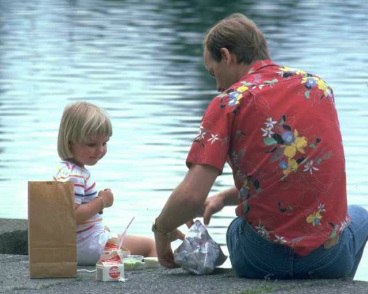Counseling Children
"There is no relationship on earth in which we are called to be more noble and to sacrifice more deeply than with our children." ~ Dan Allender, How Children Raise Parents

At times it seems that the particular children entrusted to our care have been specifically designed to trigger our greatest fears and deepest vulnerabilities. Parenting brings us to the end of ourselves and, by God's grace, to the beginning of growth.
I believe that parenting is not a methodical science but a faith-art. Trusting in God's wisdom to work in and through us, we bring together often unpredictable elements to help our children mature and grow into who they were made to be. When they get emotionally "stuck" we, their parents, often get "stuck." This is where counseling comes in.
In my counseling, I am mindful that parents are the "counselors on the ground" and as such need to be encouraged and equipped to guide their children. Parents are an integral part of my approach to helping children. My child counseling sessions generally begin with significant time with parents and child together. Parents and siblings often also leave with "homework." One-on-one time with the child client is usually characterized by structured "work" and unstructured "play" times. Techniques are drawn from a wide variety of counseling approaches including play therapy, attachment theory, developmental studies, and cognitive behavioral therapy--all filtered through a God-centered worldview.
Because of my experiences in the third world and in the inner city I have a passion and a deep love for working with abuse victims, children in foster care, and their families. Children whose parents are divorcing, because of the great changes and losses, share many of these same feelings of powerlessness and grief. One of my great joys is to bring God's healing love and light to dark places and to be a voice for the powerless when necessary.
A final note about play therapy is in order. Play is a child's natural way of figuring things out and trying on new roles and perspectives. One might say that play is a child's "language" or even a child's "work". Play therapy seeks to draw children out and help them to express themselves through the non-threatening world of symbolic play--helping them to play/talk through things that might otherwise be too overwhelming.
I believe that parenting is not a methodical science but a faith-art. Trusting in God's wisdom to work in and through us, we bring together often unpredictable elements to help our children mature and grow into who they were made to be. When they get emotionally "stuck" we, their parents, often get "stuck." This is where counseling comes in.
In my counseling, I am mindful that parents are the "counselors on the ground" and as such need to be encouraged and equipped to guide their children. Parents are an integral part of my approach to helping children. My child counseling sessions generally begin with significant time with parents and child together. Parents and siblings often also leave with "homework." One-on-one time with the child client is usually characterized by structured "work" and unstructured "play" times. Techniques are drawn from a wide variety of counseling approaches including play therapy, attachment theory, developmental studies, and cognitive behavioral therapy--all filtered through a God-centered worldview.
Because of my experiences in the third world and in the inner city I have a passion and a deep love for working with abuse victims, children in foster care, and their families. Children whose parents are divorcing, because of the great changes and losses, share many of these same feelings of powerlessness and grief. One of my great joys is to bring God's healing love and light to dark places and to be a voice for the powerless when necessary.
A final note about play therapy is in order. Play is a child's natural way of figuring things out and trying on new roles and perspectives. One might say that play is a child's "language" or even a child's "work". Play therapy seeks to draw children out and help them to express themselves through the non-threatening world of symbolic play--helping them to play/talk through things that might otherwise be too overwhelming.

